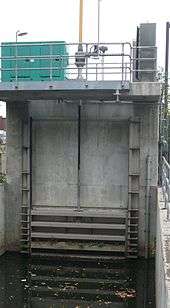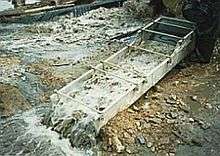Definify.com
Webster 1913 Edition
Sluice
Sluice
,Noun.
[OF.
escluse
, F. écluse
, LL. exclusa
, sclusa
, from L. excludere
, exclusum
, to shut out: cf. D. sluis
sluice, from the Old French. See Exclude
.] 1.
An artifical passage for water, fitted with a valve or gate, as in a mill stream, for stopping or regulating the flow; also, a water gate or flood gate.
2.
Hence, an opening or channel through which anything flows; a source of supply.
Each
sluice
of affluent fortune opened soon. Harte.
This home familiarity . . . opens the
sluices
of sensibility. I. Taylor.
3.
The stream flowing through a flood gate.
4.
(Mining)
A long box or trough through which water flows, – used for washing auriferous earth.
Sluice gate
, the sliding gate of a sluice.
Sluice
,Verb.
T.
[
imp. & p. p.
Sluiced
; p. pr. & vb. n.
Sluicing
.] 1.
To emit by, or as by, flood gates.
[R.]
Milton.
2.
To wet copiously, as by opening a sluice;
as, to
. sluice
meadowsHowitt.
He dried his neck and face, which he had been
sluicing
with cold water. De Quincey.
3.
To wash with, or in, a stream of water running through a sluice;
as, to
. sluice
eart or gold dust in miningWebster 1828 Edition
Sluice
SLUICE
, SLUSE,Noun.
1.
The stream of water issuing through a flood-gate; or the gate itself. If the word had its origin in shutting; it denoted the frame of boards or planks which closes the opening of a mill dam; but I believe it is applied to the stream, the gate and channel. It is a common saying, that a rapid stream runs like a sluse.2.
An opening; a source of supply; that through which any thing flows. Each sluice of affluent fortune open'd soon.Definition 2026
sluice
sluice
English

Noun
sluice (plural sluices)
- An artificial passage for water, fitted with a valve or gate, as in a mill stream, for stopping or regulating the flow; also, a water gate or flood gate.
- Hence, an opening or channel through which anything flows; a source of supply.
- (Can we date this quote?) Harte
- Each sluice of affluent fortune opened soon.
- (Can we date this quote?) I. Taylor
- This home familiarity […] opens the sluices of sensibility.
- (Can we date this quote?) Harte
- The stream flowing through a flood gate.
- (mining) A long box or trough through which water flows, used for washing auriferous earth.
- (linguistics) An instance of wh-stranding ellipsis, or sluicing.
Derived terms
Coordinate terms
Translations
passage for water
|
|
Verb

sluicing at a mine
sluice (third-person singular simple present sluices, present participle sluicing, simple past and past participle sluiced)
- (transitive, rare) To emit by, or as by, flood gates.
- 1674, John Milton, Paradise Lost, Second Edition, Book I, lines 700-704,
- Nigh on the plain, in many cells prepared, / That underneath had veins of liquid fire / Sluiced from the lake, a second multitude / With wondrous art founded the massy ore, / Severing each kind, and scummed the bullion-dross.
- 1674, John Milton, Paradise Lost, Second Edition, Book I, lines 700-704,
- (transitive) To wet copiously, as by opening a sluice; as, to sluice meadows.
- (Can we find and add a quotation of Howitt to this entry?)
- 1861, Thomas Hughes, Tom Brown at Oxford, London: Macmillan & Co., Chapter XIII,
- […] he dried his neck and face, which he had been sluicing with cold water.
- 1993, Paul Theroux, Millroy the Magician, p. 61,
- Millroy often described his kidneys—how he flushed them out. His lungs—the way he hyperventilated them. His heart—how he got it pumping, sluicing its gates and chambers.
- 2000, Laurel E. Fay, Shostakovich: A Life, Oxford University Press, Chapter 7, p. 120,
- Many years later, in 1953, Shostakovich summarized his dissatisfactions with the competition more bluntly: "Rimsky-Korsakov groomed, waved, and sluiced Musorgsky with eau de cologne. My orchestration is crude, in keeping with Musorgsky."
- (transitive) To wash with, or in, a stream of water running through a sluice.
- to sluice earth or gold dust in a sluice box in placer mining
- (transitive) (more generally) To wash (down or out).
- 1597, William Shakespeare, Richard II, Act I, Scene 1,
- […] he did plot the Duke of Gloucester's death, / Suggest his soon-believing adversaries, / And consequently, like a traitor coward, / Sluiced out his innocent soul through streams of blood
- 1910, Lord Dunsany, "Bethmoora" in A Dreamer's Tales, London: George Allen & Sons, p. 68,
- And now men with a hose have come and are sluicing out the streets.
- 1977, Timothy Findley, The Wars, Penguin Canada, 1985, p. 60,
- He also organized a bucket brigade for sluicing down the decks.
- 1597, William Shakespeare, Richard II, Act I, Scene 1,
- (intransitive) To flow, pour.
- 1932, Robinson Jeffers, "Thurso's Landing" in The Selected Poetry of Robinson Jeffers, New York: Random House, p. 311,
- In the trough behind the white wave / Helen shook her dark head, the water sluiced from her shoulders / And rose-tipped breasts.
- 1934, George Orwell, Burmese Days, Chapter 23,
- Out of sight of the houses he took off his clothes and let the rain sluice down on his bare body.
- 1980, Peter De Vries, Consenting Adults, or The Duchess Will Be Furious, Penguin, Chapter Twelve, pp. 185-6,
- these are often my thoughts as my partner or my vis-a-vis spoons a berry into her mouth and I imagine it—see and hear it being chewed, the red juice running from its bursting pulp over her tongue, mingling with her saliva, slipping through the crevices between her teeth before sluicing down her throat and into her bloodstream.
- 1986, Tanith Lee, Delirium's Mistress, New York: Daw Books, Book Two, Part Two, Chapter 6, p. 240,
- The huge things which had already careered into flight, they were enormous slothful sacks of billowing skin, and where the light sluiced over their bodies, they glimmered acid-blue and bronze.
- 1932, Robinson Jeffers, "Thurso's Landing" in The Selected Poetry of Robinson Jeffers, New York: Random House, p. 311,
- (linguistics) To elide the C` in a coordinated wh-question. See sluicing.
Coordinate terms
- (washing in mining): pan
Translations
to emit by flood gates
|
to wet copiously
|
to wash in water running through a sluice
|
Quotations
- For usage examples of this term, see Citations:sluice.
References
- sluice in Webster’s Revised Unabridged Dictionary, G. & C. Merriam, 1913